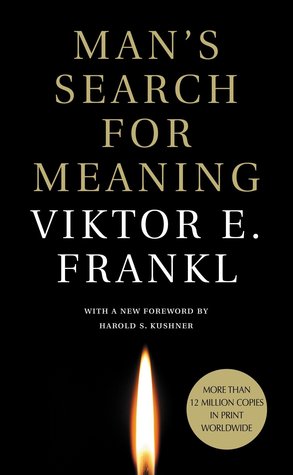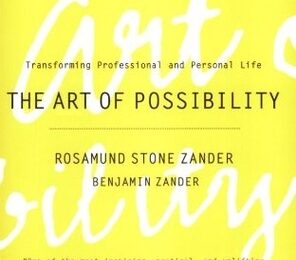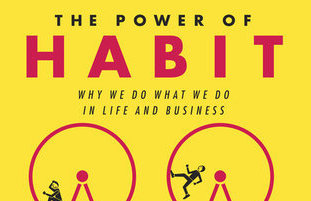Psychiatrist Viktor Frankl survived the Nazi camps by finding meaning in the face of suffering. Frankl later developed logotherapy to show us that finding meaning IS the purpose of life, the gateway to spiritual freedom which, echoing Stoic belief of reasoned choice, cannot be taken away. Ironically, we seek not equilibrium or relief of tension, but suffering, the striving and struggling to find meaning. Frankl believed self-actualization, the pinnacle of Mazlow’s hierarchy of human needs, resulted from rather than caused self-transcendence, which itself resulted from finding meaning and achieving salvation through and in love. He further believed that we were self-determining, within the limits of endowment and environment, and therefore cautioned “the world is in a bad state, but everything will become still worse unless each of us does his best.”
Some key passages I highlighted from the book:
The salvation of man is through love and in love.
Dostoevski said once, “There is only one thing that I dread: not to be worthy of my sufferings.” These words frequently came to my mind after I became acquainted with those martyrs whose behavior in camp, whose suffering and death, bore witness to the fact that the last inner freedom cannot be lost. It can be said that they were worthy of their sufferings; the way they bore their suffering was a genuine inner achievement. It is this spiritual freedom—which cannot be taken away—that makes life meaningful and purposeful. MW: Stoic
Another statistical survey, of 7,948 students at forty-eight colleges, was conducted by social scientists from Johns Hopkins University. Their preliminary report is part of a two-year study sponsored by the National Institute of Mental Health. Asked what they considered “very important” to them now, 16 percent of the students checked “making a lot of money”; 78 percent said their first goal was “finding a purpose and meaning to my life.”
Logotherapy deviates from psychoanalysis insofar as it considers man a being whose main concern consists in fulfilling a meaning, rather than in the mere gratification and satisfaction of drives and instincts, or in merely reconciling the conflicting claims of id, ego and superego, or in the mere adaptation and adjustment to society and environment.
There is much wisdom in the words of Nietzsche: “He who has a why to live for can bear almost any how.”
I consider it a dangerous misconception of mental hygiene to assume that what man needs in the first place is equilibrium or, as it is called in biology, “homeostasis,” i.e., a tensionless state. What man actually needs is not a tensionless state but rather the striving and struggling for a worthwhile goal, a freely chosen task. MW: Just as Tara Brach notes that we must lean into the suffering. The good kind of suffering that I believe Kevin Kelly discusses.
What is called self-actualization is not an attainable aim at all, for the simple reason that the more one would strive for it, the more he would miss it. In other words, self-actualization is possible only as a side-effect of self-transcendence. MW: Irony
“What would have happened, Doctor, if you had died first, and your wife would have had to survive you?” “Oh,” he said, “for her this would have been terrible; how she would have suffered!” Whereupon I replied, “You see, Doctor, such a suffering has been spared her, and it was you who have spared her this suffering—to be sure, at the price that now you have to survive and mourn her.” He said no word but shook my hand and calmly left my office. In some way, suffering ceases to be suffering at the moment it finds a meaning, such as the meaning of a sacrifice.
It is one of the basic tenets of logotherapy that man’s main concern is not to gain pleasure or to avoid pain but rather to see a meaning in his life. That is why man is even ready to suffer, on the condition, to be sure, that his suffering has a meaning.
That is why I recommend that the Statue of Liberty on the East Coast be supplemented by a Statue of Responsibility on the West Coast.
As we see, a human being is not one in pursuit of happiness but rather in search of a reason to become happy, last but not least, through actualizing the potential meaning inherent and dormant in a given situation.
Again it was Edith Weisskopf-Joelson who, as mentioned, once expressed the hope that logotherapy “may help counteract certain unhealthy trends in the present-day culture of the United States, where the incurable sufferer is given very little opportunity to be proud of his suffering and to consider it ennobling rather than degrading” so that “he is not only unhappy, but also ashamed of being unhappy.” MW: I can analogize this to money. The parent who incessantly worries that he can’t be his kids money guide is not only avoiding the conversation, but he is also ashamed of avoiding the conversation. We must stop multiplying problems by two. Or more.
More specifically, this usefulness is usually defined in terms of functioning for the benefit of society. But today’s society is characterized by achievement orientation, and consequently it adores people who are successful and happy and, in particular, it adores the young. It virtually ignores the value of all those who are otherwise, and in so doing blurs the decisive difference between being valuable in the sense of dignity and being valuable in the sense of usefulness. If one is not cognizant of this difference and holds that an individual’s value stems only from his present usefulness, then, believe me, one owes it only to personal inconsistency not to plead for euthanasia along the lines of Hitler’s program, that is to say, “mercy” killing of all those who have lost their social usefulness, be it because of old age, incurable illness, mental deterioration, or whatever handicap they may suffer.
Frankl told the audience that “It is we ourselves who must answer the questions that life asks of us, and to these questions we can respond only by being responsible for our existence.” This belief became the cornerstone of Frankl’s personal life and professional identity.
Frankl drew constantly upon uniquely human capacities such as inborn optimism, humor, psychological detachment, brief moments of solitude, inner freedom, and a steely resolve not to give up or commit suicide. He realized that he must try to live for the future, and he drew strength from loving thoughts of his wife and his deep desire to finish his book on logotherapy. He also found meaning in glimpses of beauty in nature and art. Most important, he realized that, no matter what happened, he retained the freedom to choose how to respond to his suffering. He saw this not merely as an option but as his and every person’s responsibility to choose “the way in which he bears his burden.”
A positive attitude enables a person to endure suffering and disappointment as well as enhance enjoyment and satisfaction.
“A human being is not one thing among others; things determine each other,” Frankl writes, “but man is ultimately self determining. What he becomes—within the limits of endowment and environment—he has made out of himself.” MW: Nice counterpoint to the idea that there is no self. Is the issue here humility of that endowment and environment? Because what Frankl says here rings true and provides insight into my own conundrum. People achieve, but their beginning circumstances are often mythologized or manipulated to sound better or worse as the narrative they want to craft dictates. Yet there is self-determining without a self. There is a certain type of bootstrapping with humility.


